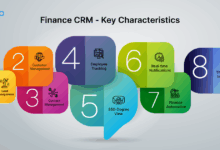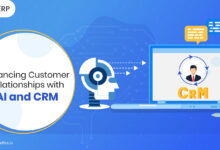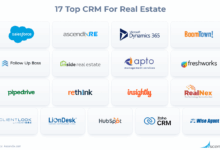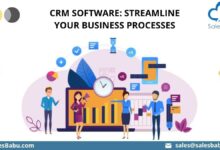AI-Powered CRM Software: Enhancing Customer Relationships With Artificial Intelligence
At the forefront of technological innovation lies AI-Powered CRM Software, revolutionizing customer relationship management with the power of Artificial Intelligence. Dive into the world where data meets personalization and efficiency.
AI is reshaping how businesses interact with customers, predict behaviors, and streamline operations. Let’s explore the transformative capabilities of AI in CRM.
What are the benefits of using AI in Supply Chain Management?
Artificial Intelligence (AI) plays a crucial role in optimizing supply chain processes by enhancing efficiency, reducing costs, and improving decision-making. It enables organizations to analyze vast amounts of data quickly and accurately, leading to better forecasting, inventory management, and overall supply chain performance.
Role of AI in Optimizing Supply Chain Processes
AI algorithms can analyze historical data to identify patterns and trends, helping businesses forecast demand more accurately. This leads to optimized inventory levels, reduced stockouts, and improved customer satisfaction. AI-powered systems can also streamline logistics operations by optimizing routes, reducing transportation costs, and minimizing delays.
Examples of AI Applications in Supply Chain Management
– Demand forecasting: AI algorithms can analyze various factors like seasonality, promotions, economic indicators, and external events to predict demand accurately.
– Inventory optimization: AI systems can analyze real-time data to adjust inventory levels, reduce excess inventory, and minimize stockouts.
– Route optimization: AI algorithms can optimize delivery routes based on factors like traffic conditions, weather, and delivery windows to improve efficiency.
How AI Improves Forecasting Accuracy in Supply Chain Operations
AI enables organizations to leverage advanced analytics and machine learning models to forecast demand more accurately. By considering a wide range of variables and data sources, AI can provide more precise predictions, helping businesses plan their supply chain activities more effectively and efficiently.
Benefits of AI-Powered CRM Software
AI-powered CRM software offers a wide range of benefits that can revolutionize customer relationship management for businesses of all sizes. By leveraging artificial intelligence, organizations can enhance customer interactions, personalize experiences, and optimize efficiency in CRM processes.
Advantages of Using AI in CRM
- AI automates repetitive tasks, saving time and reducing human errors in data entry and analysis.
- AI provides real-time insights by analyzing vast amounts of customer data, enabling businesses to make informed decisions.
- AI improves lead scoring and prioritization, helping sales teams focus on high-potential prospects.
Examples of How AI Improves Customer Interactions
- AI chatbots can provide instant customer support, resolving queries efficiently and enhancing user experience.
- AI-powered recommendation engines can suggest personalized products or services based on customer preferences and behavior.
Comparison with Traditional CRM Systems
- AI-powered CRM systems offer predictive analytics capabilities, enabling businesses to anticipate customer needs and behavior.
- Traditional CRM systems rely on manual data entry and analysis, leading to slower decision-making and less accurate insights.
Personalizing Customer Experiences with AI
- AI algorithms can segment customers based on demographics, behavior, and preferences, allowing for targeted and personalized marketing campaigns.
- AI can track customer interactions across multiple channels, ensuring a consistent and customized experience at every touchpoint.
Role of Machine Learning in Enhancing CRM Efficiency
- Machine learning algorithms can analyze historical data to identify patterns and trends, enabling businesses to optimize their sales and marketing strategies.
- Machine learning models can adapt and improve over time, providing more accurate predictions and recommendations for customer engagement.
Impact of AI on Predicting Customer Behavior for CRM Strategies
- AI can analyze customer data to predict future buying behavior, allowing businesses to tailor their offerings and communications accordingly.
- By leveraging AI insights, businesses can proactively address customer needs and concerns, fostering long-term relationships and loyalty.
Implementation of AI in CRM
AI integration in CRM software involves several key steps to ensure successful implementation. This process includes training AI models and connecting them to CRM systems to enhance customer interactions, improve decision-making, and streamline processes.
Training AI Models for CRM
- Collect and prepare data: Gather relevant customer data from various sources and ensure it is clean and structured for training.
- Choose the right algorithms: Select AI algorithms based on the specific requirements of your CRM system and the type of data being used.
- Train the AI model: Utilize the prepared data to train the AI model, adjusting parameters and evaluating performance to optimize results.
Connecting AI to CRM Systems
- Integration complexity: Ensure seamless integration of AI capabilities into existing CRM infrastructure, considering compatibility and scalability.
- Data privacy and security: Address concerns related to customer data protection and compliance with regulations when implementing AI in CRM.
- User adoption and training: Provide adequate training and support to users to encourage adoption of AI-powered features and maximize their benefits.
Best Practices for Successful AI Implementation in CRM
- Choose the right AI solution: Select a vendor or develop in-house AI capabilities that align with your CRM objectives and business needs.
- Ensure data quality for training: Maintain high-quality data inputs and regularly update and refine AI models to enhance accuracy and effectiveness.
- Create a change management strategy: Implement a structured approach to manage organizational changes resulting from AI integration, focusing on user acceptance and process optimization.
Personalization and Customer Insights
AI technology plays a crucial role in enabling personalized customer experiences by analyzing vast amounts of customer data to provide valuable insights and predictions.
AI-Driven Personalization
AI-powered CRM software utilizes machine learning algorithms to analyze customer behavior, preferences, and interactions. By understanding these patterns, businesses can tailor their marketing strategies, product recommendations, and communication channels to meet the individual needs of each customer.
- AI helps in creating personalized marketing campaigns by segmenting customers based on their preferences and purchasing history.
- Through predictive analytics, AI can anticipate customer needs and behaviors, allowing businesses to offer relevant products or services at the right time.
- Chatbots powered by AI provide personalized customer support by understanding and responding to individual queries in real-time.
Customer Insights through AI
AI analyzes customer data to provide valuable insights that can enhance decision-making processes and improve overall customer satisfaction.
- AI can identify trends and patterns in customer data, helping businesses understand their target audience better and adjust their strategies accordingly.
- By analyzing customer feedback and sentiment through natural language processing, AI can offer insights into customer satisfaction levels and areas for improvement.
- AI-driven analytics can predict customer churn by identifying early warning signs and allowing businesses to take proactive measures to retain customers.
Predicting Customer Behavior
AI plays a crucial role in predicting customer behavior by analyzing historical data and identifying patterns that indicate future actions.
- By leveraging predictive analytics, AI can forecast customer preferences and purchasing decisions, enabling businesses to tailor their offerings accordingly.
- AI-powered recommendation engines use customer data to suggest relevant products or services, increasing the likelihood of conversion and repeat purchases.
- Through machine learning algorithms, AI can predict customer lifetime value, allowing businesses to focus their efforts on high-value customers and maximize profitability.
Automation in CRM
Automation plays a crucial role in streamlining customer relationship management tasks, enhancing efficiency, and improving overall customer experience. By leveraging AI technology, CRM systems can automate various processes, allowing businesses to focus on more strategic initiatives.
Role of AI in Automating CRM Tasks
- AI automates repetitive tasks such as data entry, lead routing, and communication scheduling.
- It enables real-time data updates and notifications, ensuring timely responses to customer queries.
Improving Data Accuracy and Consistency
- AI ensures data accuracy by eliminating human errors in manual data entry processes.
- It maintains consistency in data processing, leading to reliable insights for decision-making.
Benefits of AI for Automating Lead Scoring
- AI algorithms can analyze customer data to prioritize leads based on their likelihood to convert.
- Automated lead scoring helps sales teams focus on high-potential leads, increasing conversion rates.
Efficiency of AI-Powered Automation vs. Manual Processes
- AI-powered automation significantly reduces the time required to complete CRM tasks compared to manual processes.
- Automation ensures consistency and accuracy in lead management, minimizing errors and improving overall efficiency.
AI Algorithms for Automating Customer Segmentation
- AI algorithms like clustering algorithms and decision trees are used to segment customers based on various attributes.
- Automated customer segmentation helps businesses target specific customer groups with personalized marketing campaigns.
Data Management and Analytics
AI plays a crucial role in enhancing data management and analytics within CRM systems. By leveraging AI capabilities, businesses can extract valuable insights from vast amounts of data, leading to more informed decision-making processes.
AI-Driven Data Management
- AI tools can automate data cleansing and normalization processes in CRM systems, ensuring data accuracy and consistency.
- AI algorithms can predict customer behavior and preferences based on historical data, enabling personalized marketing strategies.
Advanced Analytics and Reporting
- AI enables advanced analytics and reporting capabilities in CRM systems, allowing businesses to generate in-depth insights and forecasts.
- AI-powered predictive analytics models can be implemented to generate accurate sales forecasts, aiding in strategic decision-making.
Data-Driven Decision-Making
- AI plays a crucial role in data-driven decision-making by providing actionable insights derived from complex data sets.
- By integrating AI-driven insights into the decision-making workflow of a CRM system, businesses can make informed decisions based on data-driven recommendations.
Advantages and Limitations of AI in Data Analysis
- Advantages:
- Increased efficiency and accuracy in data processing.
- Ability to uncover hidden patterns and trends in data.
- Limitations:
- Dependence on quality data inputs for accurate analysis.
- Potential bias in AI algorithms if not properly monitored and adjusted.
Integration of AI-Driven Insights
AI-driven insights can be seamlessly integrated into the decision-making workflow of a CRM system through a structured process:
- Collect and analyze relevant data from various sources.
- Utilize AI algorithms to extract insights and patterns from the data.
- Implement the generated insights into the decision-making process of the CRM system.
Integration with Other Systems
AI-Powered CRM software offers seamless integration with other business systems, enabling organizations to streamline their operations and enhance overall efficiency. By connecting CRM with various systems, businesses can access a centralized platform for data management and communication, leading to improved decision-making and customer service.
Popular Integrations with AI-CRM Systems
- Integration with Marketing Automation Tools: AI-CRM systems can be integrated with marketing automation tools like HubSpot or Marketo to automate marketing campaigns, lead generation, and personalized communication with customers.
- Integration with E-commerce Platforms: AI-CRM software can integrate with e-commerce platforms such as Shopify or Magento to track customer behavior, manage orders, and provide personalized recommendations based on purchase history.
- Integration with Help Desk Software: Integrating AI-CRM with help desk software like Zendesk or Freshdesk enables businesses to provide timely support, track customer issues, and improve overall customer satisfaction.
- Integration with Business Intelligence Tools: AI-CRM systems can be integrated with business intelligence tools like Tableau or Power BI to analyze customer data, generate insights, and make data-driven decisions to enhance sales and marketing strategies.
Customer Service and Support
AI plays a crucial role in enhancing customer service and support within CRM systems. By leveraging AI technology, companies can provide faster, more personalized, and efficient customer interactions.
Chatbots and AI Assistants
- Chatbots are AI-powered tools that can engage with customers in real-time, providing instant answers to their queries and assisting them with problem-solving.
- AI assistants can analyze customer data, predict customer needs, and recommend relevant products or services, enhancing the overall customer experience.
Success Stories
Company X implemented AI chatbots in their CRM system and saw a 30% increase in customer satisfaction ratings due to quicker response times and personalized interactions.
Company Y used AI assistants to analyze customer feedback and improve their support processes, resulting in a 25% reduction in customer complaints.
Security and Privacy Considerations
When it comes to AI-powered CRM software, ensuring security and privacy of data is crucial to maintain trust with customers and comply with regulations. In this section, we will discuss the security challenges associated with AI-powered CRM, measures to ensure data privacy and compliance, and tips for maintaining data security in AI-CRM systems.
Security Challenges
- Increased vulnerability to cyber attacks: AI-powered CRM systems can be targets for hackers looking to exploit vulnerabilities in the software.
- Data breaches: The large amount of data processed by AI systems can be at risk of being breached, leading to loss of sensitive customer information.
- Identity theft: If not properly secured, AI-CRM systems can be used by malicious actors to steal customer identities.
Measures for Data Privacy and Compliance
- Implement encryption: Encrypting data stored in the CRM system can protect it from unauthorized access.
- Regular security audits: Conducting regular audits can help identify and address any vulnerabilities in the system.
- Compliance with regulations: Ensure that the AI-CRM system complies with data privacy laws such as GDPR to protect customer data.
Tips for Maintaining Data Security
- Train employees: Educate employees on best practices for data security to prevent internal breaches.
- Use multi-factor authentication: Implementing multi-factor authentication can add an extra layer of security to prevent unauthorized access.
- Monitor system activity: Keep track of system activity to detect any unusual behavior that may indicate a security breach.
Scalability and Customization
AI-powered CRM systems offer unparalleled scalability and customization options to meet the evolving needs of businesses. As companies grow and expand their customer base, AI can seamlessly adapt to handle increased data volumes and customer interactions. Additionally, the flexibility of AI in CRM allows businesses to tailor the software to their specific requirements, ensuring a personalized approach to customer relationship management.
Scalability with Business Growth
AI-CRM systems are designed to grow alongside businesses, providing the capability to handle a large number of customers and data points without compromising performance. As companies scale up their operations, AI algorithms can efficiently process vast amounts of data to deliver valuable insights for decision-making. This scalability ensures that businesses can continue to effectively manage customer relationships even as their customer base expands.
Flexibility for Customization
One of the key strengths of AI-powered CRM software is its ability to be customized according to the unique needs of each business. Companies can tailor the AI algorithms to capture specific customer behaviors, preferences, and interactions, enabling them to create personalized experiences for their customers. For example, AI can be used to segment customers based on their purchase history, demographics, or browsing patterns, allowing businesses to target them with relevant offers and promotions.
Examples of Tailored Solutions
– Customized Recommendation Engines: AI algorithms can analyze customer data to provide personalized product recommendations, enhancing the shopping experience and driving sales.
– Dynamic Pricing Strategies: AI-powered CRM systems can adjust pricing in real-time based on demand, competition, and customer behavior, optimizing revenue and profitability.
– Predictive Analytics: By leveraging AI for predictive analytics, businesses can forecast customer trends and behavior, enabling them to proactively address customer needs and preferences.
Industry Applications of AI in CRM
AI-powered CRM software is revolutionizing how businesses across various industries interact with their customers. By leveraging artificial intelligence, companies can personalize customer experiences, streamline processes, and drive sales growth. Let’s explore how different industries are benefiting from AI-powered CRM and the specific use cases of AI implementation in various sectors.
Retail Sector
The retail industry is utilizing AI in CRM to analyze customer preferences and behavior, enabling personalized product recommendations and targeted marketing campaigns. AI helps retailers optimize pricing strategies, forecast demand, and enhance customer loyalty through tailored interactions.
Healthcare Industry
In the healthcare sector, AI-powered CRM is improving patient engagement and care delivery. By analyzing patient data, healthcare providers can anticipate needs, schedule appointments efficiently, and provide personalized treatment plans. AI also enables proactive outreach for preventive care and medication adherence.
Financial Services
Financial institutions are using AI in CRM to enhance customer service, detect fraudulent activities, and personalize financial recommendations. AI algorithms analyze customer transactions, predict financial behaviors, and offer tailored investment options, improving overall customer satisfaction and loyalty.
Hospitality and Tourism
In the hospitality industry, AI-powered CRM systems are transforming guest experiences by personalizing offers and services based on preferences and past interactions. AI helps hotels and travel companies optimize pricing, manage reservations effectively, and deliver exceptional customer service throughout the guest journey.
Automotive Sector
Automotive companies are leveraging AI in CRM to gain insights into customer preferences, streamline sales processes, and enhance vehicle maintenance services. AI-powered CRM systems analyze customer data to deliver personalized recommendations, improve lead generation, and boost customer retention rates.
Challenges and Solutions
While AI in CRM offers numerous benefits, industries may face challenges such as data privacy concerns, integration complexities, and the need for skilled AI professionals. Companies can address these challenges by implementing robust data security measures, ensuring seamless integration with existing systems, and providing training programs to upskill employees in AI technology.
Future Trends in AI-CRM
Artificial Intelligence (AI) is set to revolutionize Customer Relationship Management (CRM) systems in the near future, enhancing customer interactions, sales forecasting, and personalized marketing strategies. Let’s delve into the upcoming trends and advancements in AI-powered CRM.
Evolution of AI in CRM
AI algorithms and machine learning are expected to play a crucial role in shaping the future of CRM. These technologies will enable businesses to analyze vast amounts of customer data in real-time, leading to more personalized and effective customer engagement. For example, AI can help identify patterns in customer behavior, predict future actions, and recommend tailored marketing strategies.
Comparison of Traditional CRM with AI-Powered Solutions
Traditional CRM methods rely heavily on manual data entry and analysis, which can be time-consuming and prone to errors. On the other hand, AI-powered CRM solutions automate processes, provide predictive analytics, and offer actionable insights based on data patterns. While integrating AI into CRM systems can be challenging due to the initial setup and training requirements, the long-term benefits in terms of efficiency and effectiveness are significant.
Ethical Implications of AI Implementation in CRM
As AI technology continues to advance in CRM, ethical considerations regarding data privacy, algorithm bias, and customer consent become increasingly important. Businesses must ensure that customer data is handled securely and transparently, and that AI algorithms are trained on unbiased datasets to avoid discriminatory outcomes. Maintaining ethical standards in AI implementation is crucial for building trust with customers and ensuring compliance with data protection regulations.
Training and Adoption of AI-CRM
Training employees on AI-CRM systems is crucial for successful implementation and utilization within an organization. Without proper training, employees may not fully understand the capabilities of the system or how to leverage its features effectively. Therefore, investing in comprehensive training programs is essential to maximize the benefits of AI-powered CRM.
Importance of Employee Training
Implementing AI-CRM systems requires a shift in mindset and skillset for employees. Training helps them understand the new technology, its functionalities, and how it can streamline processes and improve customer interactions. It also boosts confidence in using the system, leading to increased productivity and efficiency.
- Provide hands-on training sessions to ensure employees are familiar with the AI-CRM interface and tools.
- Offer continuous support and resources for ongoing learning to keep employees updated on system updates and best practices.
- Encourage a culture of learning and experimentation to foster innovation and creativity in utilizing AI-CRM capabilities.
Strategies for Successful Adoption
To ensure successful adoption of AI-CRM systems, organizations should focus on change management strategies that facilitate a smooth transition. This includes clear communication, stakeholder involvement, and addressing employee concerns effectively.
- Communicate the benefits of AI-CRM to employees and involve them in the decision-making process to gain buy-in and support.
- Address resistance to change by highlighting how AI-CRM can enhance job roles, improve customer relationships, and drive business growth.
- Create a structured implementation plan with defined milestones and measurable outcomes to track progress and success.
Tips for Smooth Transition
Transitioning to AI-powered CRM can be challenging, but with the right approach, organizations can minimize disruptions and maximize benefits. Here are some tips for ensuring a smooth transition:
- Start with pilot projects to test AI-CRM capabilities in real-world scenarios before full implementation.
- Provide regular feedback and performance evaluations to identify areas for improvement and optimize system usage.
- Offer incentives and rewards for employees who demonstrate proficiency in using AI-CRM effectively.
Comparison: Traditional CRM vs. AI-Powered CRM
| Traditional CRM | AI-Powered CRM |
|---|---|
| Manual data entry and processing | Automated data capture and analysis |
| Static customer insights | Dynamic customer segmentation and personalization |
| Reactive customer service | Proactive customer engagement and support |
Integrating AI-CRM into Workflows
Integrating AI-CRM into existing workflows and processes requires careful planning and coordination. Organizations can follow these best practices for a seamless integration:
- Identify key touchpoints where AI-CRM can add value and enhance customer interactions.
- Train employees on how to incorporate AI insights into decision-making processes and customer engagement strategies.
- Monitor performance metrics and feedback to continuously optimize AI-CRM integration for maximum impact.
Case Studies of Successful Implementation
Real-life case studies of companies that have successfully implemented AI-CRM systems can provide valuable insights and best practices for adoption. Examples include how Company A improved customer engagement by implementing AI-powered chatbots or how Company B enhanced sales forecasting accuracy with AI-driven analytics.
Overcoming Challenges in Adoption
Common challenges organizations may face during the adoption of AI-CRM include resistance to change, lack of technical expertise, and data privacy concerns. To overcome these challenges, organizations should focus on providing comprehensive training, addressing employee concerns, and ensuring data security and compliance.
Role of Leadership in Adoption
Leadership plays a crucial role in driving the adoption of AI-CRM within an organization. Executives and managers should champion the use of AI technology, provide resources for training and development, and set clear goals and expectations for AI-CRM implementation. By leading by example and fostering a culture of innovation, leadership can inspire employees to embrace AI-CRM and leverage its full potential.
Final Conclusion
From personalized marketing strategies to predictive analytics, AI-Powered CRM Software offers a glimpse into the future of customer relationship management. Embrace AI to unlock new possibilities and elevate your CRM experience.




